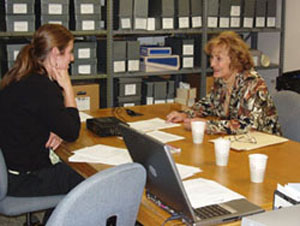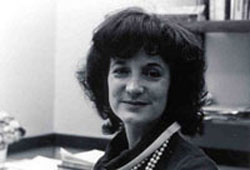
| Lane Home Page | Search Lane |
| Website Accessibility |

History: Online Exhibits Oral History - Joyce Salisbury Joyce Salisbury taught in the English, Foreign Language & Speech Department at Lane Community College from 1972-2000. In this oral history interview, conducted November 1, 2005, Joyce talks about the origins of the Willamette Writers Guild and the political environment that shaped it. Excerpts from the oral history are printed below. Contact the college archivist for access to the recording of the interview.
At Lane Community College Joyce Salisbury was born in Iowa and educated at Drake University in Des Moines. She moved to Oregon in 1960 with her husband, an English professor at the University of Oregon. She taught grade school in Eugene for 10 years before receiving a Masters of Fine Arts from the U of O in 1970. Joyce began her teaching career at Lane in 1972, retiring nearly thirty years later. As an instructor for the English, Foreign Language & Speech Department, she taught Freshman Composition, Introduction to Literature, Creative Writing, Poetry, Children's Literature, Women Writers, and Image of Women in Literature. In addition to her work with the Willamette Writers Guild, Joyce was also involved in Lane's Status of Women committee, which investigated wage issues and gender. Her political and social activism was not confined to her work as an English instructor. She was active in trying to change the community for its youngest members. She worked to establish a local Head Start program and fought to bring public kindergarten into the grade schools. This stemmed from her experiences as a grade school teacher, where she noticed a discrepency in the reading abilities of students who had attended kindergarten and those who had not. She attributed this to economics and class. There were PTA programs, where parents could pay for kindergarten, but not all had the financial resources; Joyce worked with state and local groups to change this, and, in 1972, saw a free public kindergarten in Eugene. The Origin of the Willamette Writers Guild
Six colleges from the central and southern Willamette Valley (Lane Community College, the University of Oregon, Oregon State University, Linn-Benton Community College, Willamette University, and Chemeketa Community College) each put $500 in a fund to begin a program dedicated to providing high quality community events that would foster an interest in the literary arts and humanities. Lane's grant writer, Lisl Fenner, wrote up a grant proposal to secure matching funds for the Willamette Writers Guild.
I think that that's what we were interested in [race and gender issues], besides being interested in the poetry and the writing, or the how to get published thing, but we wanted our students to have a broader experience, too, than they were getting . If you think about the women's rights issue, when that equal rights amendment was about to be passed in Illinois, there were women holding onto the gate at the capital of Illinois legislature, and people were chaining themselves to the gate, so it was an issue that the women felt strongly about, and when it didn't pass there, that was the last hold out, the last chance, we just sort of flopped and I think there was a backlash from the other side [ in the 80s ]. [Laughing] [... What about since 1984?] I think younger people have taken over, or have not taken over, and we're not as interested. And my interest has always been for the underdog and that's why I was involved in women's issues and black women writers. The Guild members goal was to give their students something more than the standard materials presented to them in their courses. About Gwendolyn Brooks She was a very impressive figure . her poetry is marvelous. And she had a way of chanting it, or singing it, that was very impressive, catchy. But she did comment on the audience, to the audience, about their being so white ... they just couldn't say anything because they were. There were a few black faces, but hardly any. You know, we are a white community and we have struggled with that for all the years I've been there. Do you think that has changed? I think it's changed, yes, I've been active in trying to change that. About Chinosole She's a dear friend and I really admire her. She came here and was teaching at LCC and got her PhD in Comparative Lit at the same time she was teaching here. Was she active in the WWG? She was active in helping us get some of the people for the Racism and Sexism Conference, particularly, and that was in 1983, I think. She knew the people who had been writing on those issues, Gloria Watkins and Sylvia Winter and Pat Warner spoke and they had written not fiction and not poetry, but articles on racism and sexism from the black perspective. Chinosole left Lane Community College in 1986 to take a position as the chair of the women studies department at San Francisco State University; she retired in 2003. In 2001, she wrote African Diaspora and Autobiographics: Skeins of Self and Skin. Why did it end? This was an ambitious project, only nominally supported by the institutions, and fatigue set in for the organizers. I think the people that were active in it got tired because we were teaching full-time as well . and I think Lisl Fenner had tapped the financial resources for as long as she could, though I am not sure of that . I think we were kind of advised to move on, I think maybe the college didn't want to put any more money into it, I don't know. The Lasting Impact of This Collection
If they investigate this and wonder about why we were so interested in these writers, I think if they started reading some of them, they would know. They are alive and they are still alive, even if they are dead, if you read their works. They are a way of seeing that we don't often see, we don't often think of, and poets do that to you, I think. Summary of Interview
For a transcript of the oral history or to listen to the recorded interview, contact Lane Community Archives. Related web sites:
|
>> Return to Lane's Home Page >> Return to Archives Main Page >> Return to top of page Lane Community College - Archives and Records 4000 East 30th Avenue, Eugene, OR 97405 Phone: 541-463-5466 Fax: 541-463-3996 Center Building, Rooms 18-19-20 Please direct comments about this site to archives@lanecc.edu Revised 8/16/06 (eu) © 1996-present Lane Community College |


